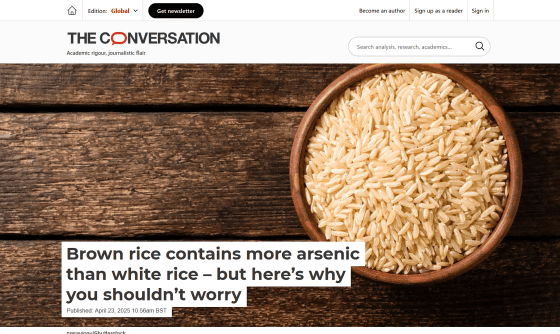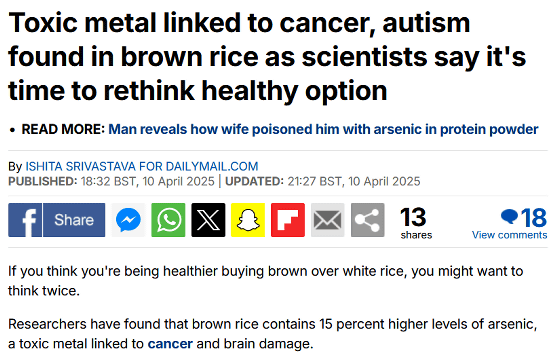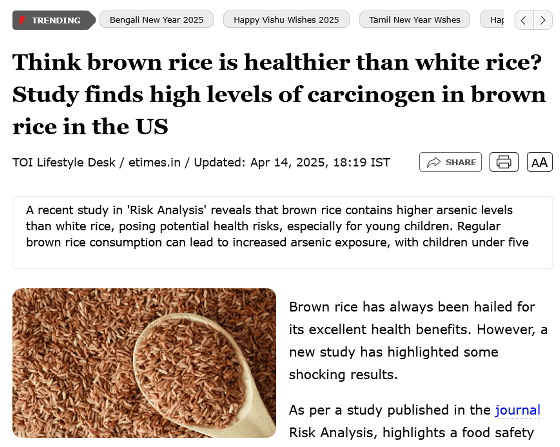Experts explain that brown rice contains more arsenic than white rice, but that this is not a problem and that it is better to eat brown rice

A US
Brown rice contains more arsenic than white rice – but here's why you shouldn't worry
https://theconversation.com/brown-rice-contains-more-arsenic-than-white-rice-but-heres-why-you-shouldnt-worry-254668

' Brown rice ' is rice with the bran still intact, and some health-conscious people actively eat brown rice, as it is said to be more nutritious than white rice , from which the bran has been removed.
However, new research has shown that brown rice contains more arsenic than white rice. While arsenic has been used in pesticides and preservatives, it has also been used in drinking water and other places as a source of pollution after arsenic leaks from mines, and has also been used in poisoning and assassination.
Some media outlets responded to the study results with sensational headlines such as 'Toxic metals linked to cancer and autism found in brown rice, scientists say it's time to rethink healthy choices' and 'Think brown rice is healthier than white rice? Study finds high levels of carcinogens in American brown rice.'
Toxic metal linked to cancer, autism found in brown rice as scientists say it's time to rethink healthy option | Daily Mail Online
https://www.dailymail.co.uk/health/article-14593619/inorganic-arsenic-cancer-brown-white-rice.html

Brown Rice Health Benefits: Think brown rice is healthier than white rice? Study finds high levels of carcinogen in brown rice in the US | - The Times of India
https://timesofindia.indiatimes.com/life-style/health-fitness/health-news/think-brown-rice-is-healthier-than-white-rice-study-finds-high-levels-of-carcinogen-in-brown-rice-in-the-us/articleshow/120266618.cms

But Brownie argues that people need not worry about the arsenic in brown rice: 'To understand this issue, it's helpful to remember an old principle of toxicology: 'dose makes toxicity.' In other words, low doses of a harmful substance can be harmless or even beneficial,' he says.
While arsenic is a well-known poison, it is also naturally occurring in soil and water and may be present naturally in many foods, including rice. The amount of arsenic in brown rice shown in the new study is well below the threshold for risk to human health.
'Pesticides, preservatives, trace metals - all of these terms may sound scary out of context, but for most people, the health risks come from everyday choices, not from tiny amounts in our food,' Brownie said, explaining that eating brown rice makes it unlikely that you'll get arsenic poisoning.
In addition to worrying about arsenic in foods such as brown rice, we also need to consider the disadvantages of not eating brown rice. Very few people in developed countries like the UK follow the national healthy dietary guidelines, and most people do not eat enough fruit, vegetables and whole grains .
Whole grains are grains that have not had the bran removed, including the pericarp and germ, and products made from them in general. Brown rice, which has the bran still attached, is also a type of whole grain. In other words, if you have the option of eating brown rice instead of white rice, you can supplement your diet with the whole grains that you may be lacking.

Poor diet is a major cause of disease and premature death worldwide, more so than smoking or alcohol. The top two dietary risk factors are 'excessive salt intake' and 'lack of whole grains,' and eating whole grains is one easy way to reduce the risk of cardiovascular disease, which kills about 20 million people a year .
So even though brown rice does contain more arsenic than white rice, not eating brown rice or other whole grains is itself a higher health risk, and if you're still concerned about brown rice, you can consider other options, such as eating bread or pasta made from whole wheat flour.
Brownie advises: 'If you're fortunate enough to have a choice about what you eat, take a moment to reflect on how your diet aligns with national dietary guidelines. If you're already eating well, great - keep doing it. If not, start with small changes like incorporating some whole grains and reducing your salt intake.'
Related Posts:
in Free Member, Science, Food, Posted by log1h_ik







